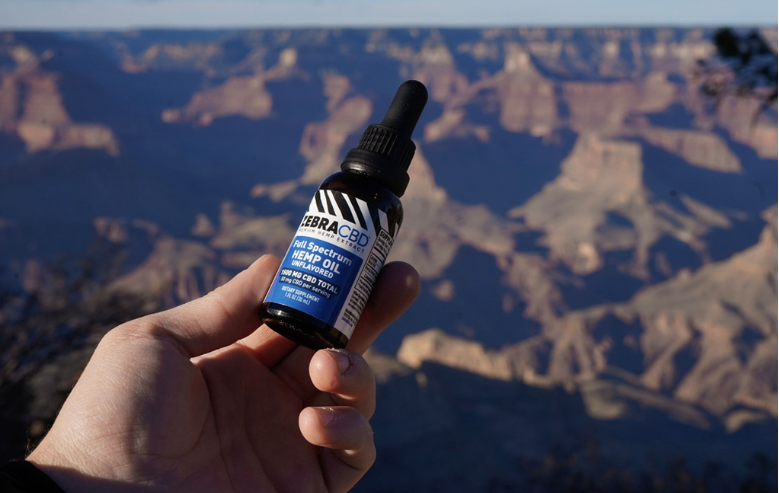
Tinctures are a type of extract that come from the natural world — either animal- or plant-derived and dissolved in ethanol.
So, what is a CBD tincture? CBD, or cannabidiol, is a type of cannabinoid that’s extracted from the industrial hemp plant — Cannabis sativa, which is grown and harvested for its leaves, flowers and seeds.
CBD tincture, specifically, comes from the leaves and flowers.
When consumed or applied topically, CBD tincture may help to support full-body health as it interacts directly with the body’s widespread regulatory network, the endocannabinoid system.
How It’s Made
Both hemp plants and marijuana plants are categorized as Cannabis sativa. The only differentiating factor is their THC, or tetrahydrocannabinol, profile. Legally, hemp plants contain no more than 0.3% THC and are federally legal. Marijuana plants, on the other hand, contain high levels of psychoactive THC and are not legal on the federal level; although, some states have legalized marijuana.
Cultivation
Civilizations have used hemp for thousands of years to produce textiles, rope, paper and other materials. Its versatility and sustainability have made it a valuable resource in various industries. In recent years, there has been a resurgence of interest in hemp due to its potential as a renewable alternative to traditional materials, its nutritional benefits and its potential applications in medicine and wellness products.
Hemp thrives in temperate zones with at least 2.5 inches of annual rainfall. They also require soil that drains well. Additionally, hemp grown for CBD tinctures requires significant watering, and these crops are usually supplemented with an irrigation source.
In ideal conditions, hemp can grow up to 16 feet high.
Growing methods differ depending on what the plant will be used for. Hemp for CBD oil is planted at a high density — at a rate of 1,000 to 2,000 plants per acre. This maximizes cannabinoid production, allowing cultivators to efficiently extract the CBD oil from each plant. This process is particularly labor intensive.
Additionally, farmers will only use female plants to cultivate CBD oil, as they produce more seeds compared to male plants.
Harvesting
By law, all harvesting methods must produce legally compliant CBD oil with THC levels no higher than 0.3%. This requires a meticulous timetable. If the plant continues to mature, the plant can contain more than the legal limit of THC. If this occurs, the entire plot must be destroyed.
Since hemp is an annual plant, it can be grown throughout the year. In 90 to 120 years, the cannabinoid-rich flowers are fully mature and ready for harvest. That said, during the colder months, hemp plants are less likely to reach optimal heights.
In most states, cultivators harvest their outdoor hemp crops in October. In warmer climates, farmers may be able to harvest twice throughout the year.
To gather the flowers and leaves for hemp extraction, most cultivators will choose to harvest by hand to maintain the plant’s delicate structures. Some may use combines; however; this puts the crop at a greater risk of damage and microbial contamination.
To remove the hemp flowers properly, farmers will:
- Identify the plants with the biggest flowers
- Observe the trichomes (tiny hairs) of the plant (should be milky white) to determine cannabinoid density
- Cut one foot to two feet of the flower-dense stalk
- Avoid roughness to prevent bruising of the flowers
Storage and Testing
Once harvested, the plant must be stored in an area without direct sunlight. It must also be properly ventilated with a temperature of 60 to 70 degrees Fahrenheit to maintain the integrity of the plant.
During this time, the CBD product will also undergo testing to determine the potency of cannabinoids and confirm that it’s free from contaminants and toxins.
Extraction
Once the lab results are back and the CBD product has passed, it can move onto the extraction process, in which the pure CBD oil is separated from the rest of the plant material.
The exact extraction method differs depending on the manufacturer. Potential strategies include:
- Solvent extraction – This method involves using solvents such as ethanol, butane or CO2 to extract CBD from the hemp plant material. The solvent is passed through the plant material, dissolving the cannabinoids and other desired compounds. The resulting solution is then processed further to remove the solvent, leaving behind a concentrated CBD extract.
- CO2 extraction – CO2 extraction is a popular CBD oil extraction method due to its efficiency and safety. In this process, carbon dioxide is used as a solvent under high pressure and low temperatures to extract cannabinoids from the hemp plant material. The CO2 acts as a solvent, dissolving the cannabinoids and other desired compounds, which are then separated from the CO2 to produce a concentrated CBD extract.
- Hydrocarbon extraction – Hydrocarbon extraction involves using hydrocarbon solvents such as butane or propane to extract cannabinoids from the hemp plant material. Similar to solvent extraction, the solvent is passed through the plant material to dissolve the cannabinoids, which are then separated from the solvent to produce a concentrated CBD extract.
- Supercritical fluid extraction– This method utilizes supercritical fluids, such as CO2, which have properties of both liquids and gasses when exposed to specific temperature and pressure conditions. Supercritical CO2 is passed through the hemp plant material, extracting cannabinoids and other desired compounds. The supercritical CO2 is then separated from the extract, leaving behind a concentrated CBD oil.
- Ethanol extraction – Ethanol extraction involves soaking the hemp plant material in ethanol to extract cannabinoids and other compounds. The mixture is then filtered to remove plant debris, and the ethanol is evaporated to leave behind a concentrated CBD extract.
More Testing
Once manufacturers separate the pure CBD oil, it requires further testing to ensure that the process worked and the CBD is in fact pure and contains no unwanted plant materials.
Once formulations are finalized, the CBD tincture will undergo even more testing in a third-party lab to verify its ingredients, potency and overall quality. Then, once the lab results have been approved, it’s ready to be packaged and sold to consumers looking for relief and wellness support.
Depending on the extraction method and further processing, the resulting CBD can be classified into different types, such as CBD isolate, which contains purely CBD with no other cannabinoids or terpenes, and broad-spectrum CBD, which retains a range of cannabinoids and terpenes but is typically THC-free. These variations offer consumers options based on their health goals and preferences.
CBD Tincture Uses
CBD tinctures offer a natural and holistic approach to health and wellness, with numerous potential benefits that include:
- Easing nervousness – CBD interacts with the body's endocannabinoid system, which plays a crucial role in regulating mood, stress response and overall mental health. Many users report experiencing a sense of calm and relaxation after using CBD tinctures, making them a popular addition to teas, smoothies and other dishes. That said, they’re most effective when consumed sublingually (under the tongue).
- Relieving aches – Research suggests that CBD may have analgesic and anti-inflammatory properties, making it potentially effective for managing discomfort throughout the body. By interacting with cannabinoid receptors in the body, found in the central and peripheral nervous systems, CBD tinctures may help improve one’s overall sense of comfort.
- Supporting quality sleep – For people who struggle with falling asleep or staying asleep during the night, a CBD tincture may help by regulating moods and reducing physical discomfort in the body.
Given the CBD oil benefits spanning from mood regulation to pain relief, it's clear why tinctures have become a preferred method for consuming CBD.
CBD Tincture Benefits and Drawbacks
Generally, CBD tinctures are safe for daily use. Potential advantages include:
- Quick absorption – CBD tinctures offer fast absorption when taken sublingually, allowing the cannabinoids to enter the bloodstream more rapidly compared to other methods of consumption. This quick onset of effects makes tinctures an excellent choice for those seeking immediate relief from uncomfortable symptoms.
- Precise dosage control– CBD oils come with droppers that allow for precise dosage control. Users can easily adjust their dosage of CBD oil drops based on their individual needs and preferences, making it easier to find the optimal dosage for desired effects. This level of control is especially beneficial for newcomers to CBD who may need to start with lower doses and gradually increase as needed.
- Portability – CBD tinctures are compact and easy to carry, making them convenient for on-the-go use. Whether at home, work or traveling, users can discreetly and conveniently administer CBD tinctures whenever needed without long-winded preparation.
- Versatility – CBD tinctures can be taken sublingually, added to food or beverages or even mixed with skincare products for topical use. This versatility allows users to customize their CBD experience according to their preferences, lifestyle and needs.
- Long shelf life – CBD tinctures typically have a long shelf life, especially when stored properly in a cool, dark place away from direct sunlight. This means that they can be used over an extended period of time.
That said, there may be some drawbacks to using CBD tinctures. These include:
- Potential contamination– CBD products can vary. Less reputable manufacturers may be selling products with contaminants or high levels of THC. To ensure the quality of your product, you can access its potency and ingredients list through its Certificate of Analysis.
- Taste – CBD oil drops can taste earthy and bitter. For some, this can deter long-term use. Fortunately, CBD tinctures are easily mixed into drinks and foods, which may make them more palatable.
- Limited research – Currently, there is very little research on CBD oil usage in humans, particularly when it comes to its interaction with certain medications, supplements and alcohol. If you have a concern, discuss your usage with a healthcare provider.
While considering the benefits and potential drawbacks, exploring a variety of CBD products can help you find the format that best fits your wellness routine.
Zebra CBD: CBD Tinctures You Can Trust
Generally, CBD tinctures are incredibly versatile and can provide much-needed support to your general health and wellness. For premium hemp extract you can trust, shop with Zebra CBD online.
Our CBD tinctures are made with premium hemp extract that’s been third-party tested to provide you with well-rounded support you can trust.
Shop our full-spectrum CBD oil blend today to get started. Additionally, you can explore our other various products, such as our CBD topicals, CBD capsules, and CBD Gummies for sale.
Sources:
- Britannica. Hemp. https://www.britannica.com/plant/hemp
- OSU. 10 things you need to know before growing hemp. https://cfaes.osu.edu/node/13091
- ACS Lab. How and When to Harvest Hemp. https://www.acslab.com/cultivation/cultivation-how-and-when-to-harvest-hemp








